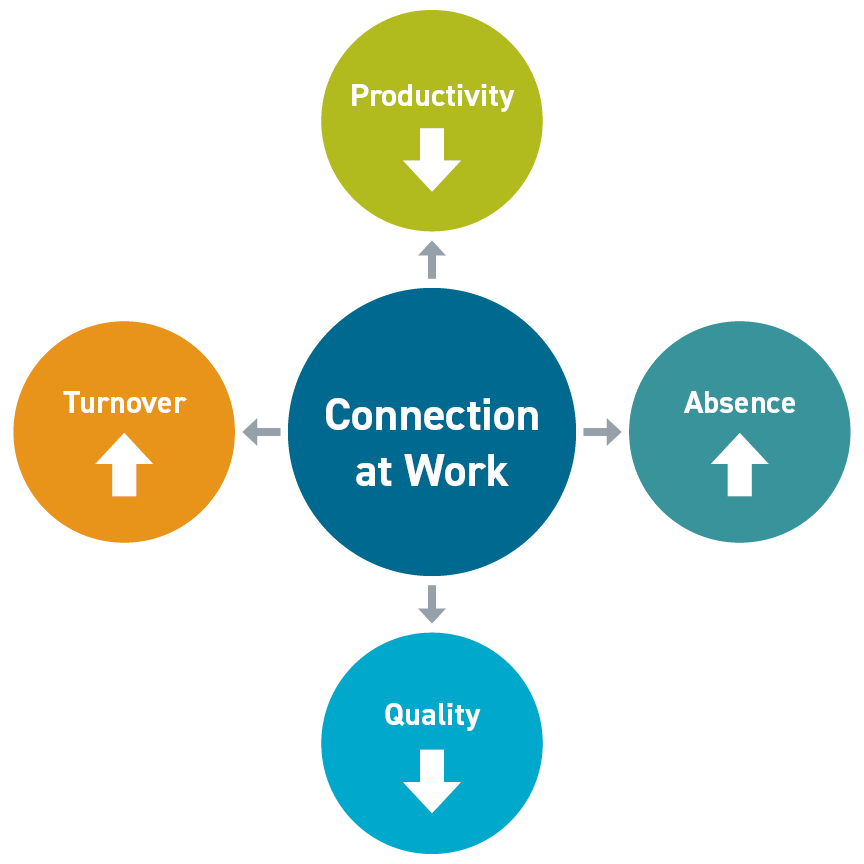[ad_1]
Dustin A. Jackson, Ph.D. and BHDP’s Samantha Delabar discover methods to rebuild the misplaced connectedness as staff return to the workplace.

Ninety-five % of all every day choices are made by the unconscious a part of the mind, together with decisions made at work. These embody however aren’t restricted to choices to be social, engaged, and related with these round you. Whereas this decision-making course of is unconscious and primal, neuroscience can make clear the methods by which individuals are likely to really feel related or disconnected within the office. That is necessary as a result of analysis on this matter exhibits that feeling related within the office correlates to staff’ sense of being extra (or much less) engaged, productive, and dependable.
When the COVID-19 pandemic compelled many companies to shut places of work and enterprise services, staff migrated to digital, distant, and earn a living from home (WFH) choices. Although working from dwelling feels like a dream to many, psychological and social disconnects from the office and coworkers had been an often-tragic outcome. Consequently, organizations had been and are challenged to seek out methods to rebuild the misplaced connectedness as staff return to the workplace.
From a strategic organizational psychology perspective, it will require creating a brand new tribal expertise, a strategic concentrate on psychological well being, and offering an atmosphere that meets staff’ primal wants. The underside line: it’s about placing individuals first in a approach that has by no means manifested earlier than within the office. It means leveraging a psychological and neuroscience method, perspective, and mindset.
Human connectedness within the office
Connectedness is among the primary primal wants each individual seeks. Being related means being bodily, mentally, and emotionally near these round us. It comes from being thought-about a part of a gaggle or “tribe.” By nature, people are social and emotional beings, and shut connections with different individuals launch oxytocin into the mind. This can be a neurotransmitter accountable for the emotions of belief, recognition, bonding, attachment, and love. As well as, being related and shut with others may even enlarge the Amygdala, which is the portion of our mind that offers with “social and emotional regulation.” Connectedness means various things to individuals at totally different phases of their lives. If you end up youthful, connectedness means survival by individuals caring for you. As you grow old, connectedness has extra to do with attaining success than survival.

The degrees of human connectedness
The diploma of human connectedness craved or desired by people varies from one individual to the following. Some are extra people-oriented with a bigger social community of associates and acquaintances, whereas others have a tight-knit circle of two to 5 associates. The lower in connectedness, particularly in the course of the peak of the pandemic, drastically restricted the methods co-workers might really feel related to 1 one other. A current Stanford College examine revealed that 39 % of all relationships started on-line. This implies it’s attainable to begin to construct connections nearly. Nonetheless, many new digital relationships battle once they transition to an in-person relationship. This transition is extra of a battle than most notice. The battle is a results of the mind taking random items of knowledge, filling within the lacking gaps, and making a story that is smart to us and feeds the beliefs we would like. Identical to this instance, within the digital atmosphere there may be not sufficient info or components of connectedness for the mind to create a narrative, which ends up in incomplete connectedness. There’s even a time period for filling in nonexistent info within the mind, Pareidolia, which is creating an image or narrative out of random items of knowledge to attract a conclusion.
Within the digital working atmosphere, we expertise that partial connectedness. You probably have not put work into furthering that story or narrative, when you return into the office it’s going to be totally different than what it was.
When conferences are scheduled in a digital atmosphere, even when contributors can see one another, the assembly will be very dry. For instance, after working via a gathering agenda, reviewing standing, going over coverage, and creating motion plans there may be little to no alternative in digital conferences for these water fountain sort moments that bonds individuals, which comes from sharing the identical bodily area. Then again, there’s a psychological security internet that comes from the onsite office. Amazon’s management ideas are a main instance, the place it’s okay to confront others with a differing viewpoint, to face your floor. That contrasts from extra autocratic work eventualities the place some are afraid to talk up, even once they see dangerous concepts being adopted. Typically, they worry destructive reactions to their objection and resolve it isn’t definitely worth the struggle.
The Nice Resignation and an absence of connectedness
The lack of “tribe” when virtually everybody needed to earn a living from home loosened the bond many had with their employers and associates. The Nice Resignation ought to have been known as the Nice Disconnect. This led some to ponder what was actually necessary in life. In consequence, the decision to return to the workplace wasn’t compelling sufficient, and so they began in search of different choices—maybe a hybrid place if not remaining full time distant. Their connectedness transitioned from the office to the house—creating a brand new norm with households, associates, and luxury ranges.
Growing connectedness requires reigniting that sense of tribalism within the office. Take into consideration the facility of teams to perform one thing higher than what people can do on their very own. Sports activities groups, non secular teams, and the start of recent governments are only a few examples. Success comes from acutely aware efforts to create a loyal tribe. This could begin with small gestures like logoed shirts or different customized objects. Different perks embody retaining some stage of flexibility of the place work will get achieved and sustaining a way of management over their lives like that they had at dwelling. Additionally, staff have to know that the work they do is significant. These little variations could make all of the distinction in rising connectedness.
After we speak about connectedness, we’re not speaking about strangers or acquaintances. We will need to have that connection and a bond with these round us that’s deeper. Give your individuals that chance to attach.

Greatest practices
Simply saying staff come first or tacking up a poster of core values on a wall isn’t sufficient. Corporations have to concentrate on psychological well being, create a way of belonging and deal with primal must foster connectedness. Listed below are some finest practices to perform these targets:
- Enable staff to have some stage of management. With out that the everyday human mind isn’t relaxed sufficient and anxiousness will increase. A versatile work association helps.
- Let individuals understand how significant their work is. Put individuals first and take heed to them in earnest. A part of that is additionally monetary in nature and consists of enough compensation past the everyday three % annual elevate.
- Acknowledge the change in unconscious tradition that has taken place over the previous few years. For instance, our unconscious tradition used to incorporate a “Concern of Lacking Out” (FOMO); nonetheless, now we have transitioned to a “Concern of Being Concerned” (FOMI) one. Begin constructing the FOMO for workers via perks or alternatives.
- Give attention to the idea of psychological capital. The psychological capital of an worker is immediately associated to their sense of wellbeing, work life stability, job satisfaction, and readiness for change within the office.
Take motion to make actual change in a company
As neuroscience and psychology analysis exhibits, there may be an innate want for human connectedness in all of us to differing levels. The pandemic and the surge in distant working confirmed the worth in human connectedness and the psychological impacts of not having that attachment. Many who didn’t really feel that bond had been among the first to maneuver on in the course of the Nice Resignation.
To create connectedness within the office will be difficult to implement. Most organizations run on a “that’s simply how we do issues round right here” mentality as an alternative of “how can we do issues higher round right here?” The reply comes from creating a brand new and improved tribe and a real atmosphere of psychological security. Present your people who their work is significant and join your individuals’s jobs to the notion of working towards the higher good. That may assist them really feel extra related to work and to their coworkers. Lastly, acknowledge that an individual’s unconscious is the place most choices are made, and nurture their primal unconscious wants can result in a extra engaged and dependable workforce.
[ad_2]
Source link



